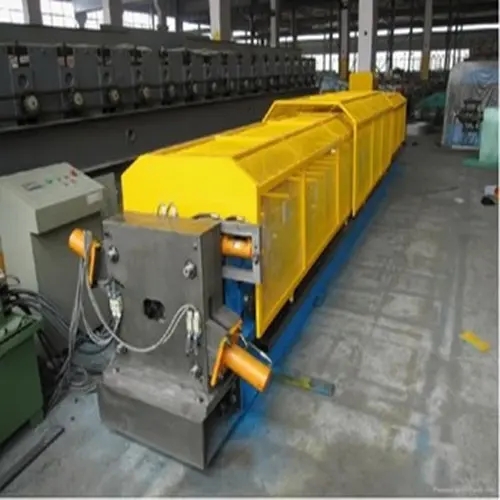
Metal Deck Roll Forming Machine Revolutionizing Construction and Manufacturing
The advancement of technology in the construction and manufacturing industries has paved the way for innovative solutions that enhance efficiency, quality, and cost-effectiveness. Among these innovations, the metal deck roll forming machine stands out as a vital tool in the production of metal decking, which is extensively used in various applications, including commercial, industrial, and residential constructions.
A metal deck roll forming machine is a specialized piece of equipment designed to convert metal sheets into precise, interlocking profiles. This process is known as roll forming, which involves passing the sheet metal through a series of rollers. Each roller sequentially shapes the metal into the desired cross-section, resulting in a continuous, uniform product. The versatility of metal deck roll forming machines allows manufacturers to produce various decking profiles, including steel, aluminum, and galvanized materials.
One of the most significant advantages of using metal deck roll forming machines is their ability to produce high-quality products with minimal waste. Traditionally, metal decking was manufactured using cutting methods, which often resulted in excessive scrap material. However, the roll forming process optimizes material usage, making it an environmentally friendly option. The continuous nature of the roll forming process reduces the likelihood of defects, ensuring that the final product meets the required specifications for strength and durability.
In addition to improving material efficiency, metal deck roll forming machines also enhance production speed. The automation involved in the roll forming process allows for quicker setup times and streamlined operations. This efficiency translates to lower labor costs and faster turnaround times, making it an attractive solution for manufacturers aiming to meet tight deadlines. With the ability to produce several linear meters of decking in a matter of minutes, businesses can significantly increase their output without compromising quality.

The introduction of advanced technology into metal deck roll forming machines has further improved their capabilities. Features such as computerized controls, programmable settings, and real-time monitoring systems enable manufacturers to achieve precise dimensions and shapes consistently. These innovations also facilitate easier maintenance and troubleshooting, minimizing downtime and ensuring that production lines remain operational.
Moreover, metal deck roll forming machines are adaptable to various production requirements. Manufacturers can customize their machines to produce specific profiles and sizes, catering to different building codes and design preferences. This flexibility is particularly advantageous in a competitive market where architects and engineers seek unique solutions for their projects. By offering a range of customizable options, manufacturers can differentiate themselves and meet diverse customer needs.
Furthermore, the integration of metal decking in construction provides structural advantages. Metal decks are known for their strength-to-weight ratio, which contributes to the overall stability of a building while reducing material costs. They are also resistant to fire, pests, and mold, ensuring longevity and lower maintenance requirements. As a result, the demand for metal decking continues to rise, further solidifying the role of metal deck roll forming machines in modern construction.
In conclusion, metal deck roll forming machines represent a significant advancement in the manufacturing of metal decking. Their ability to produce high-quality, efficient, and customizable products makes them indispensable in the construction industry. As technology continues to evolve, these machines will likely play an increasingly prominent role in meeting the demands of modern architecture and infrastructure, driving innovation and growth in the sector. With sustainability and efficiency at the forefront, the future of construction looks promising with the continued utilization of metal deck roll forming machines.